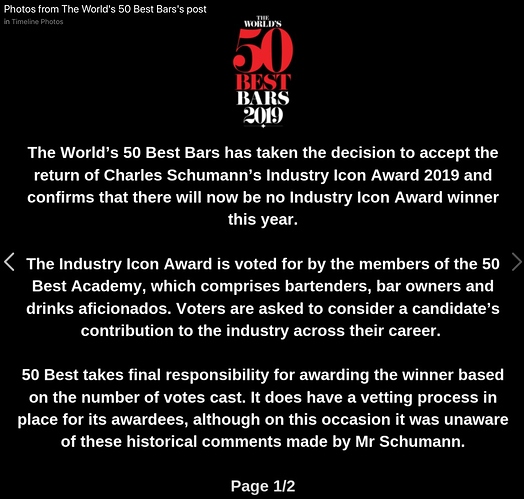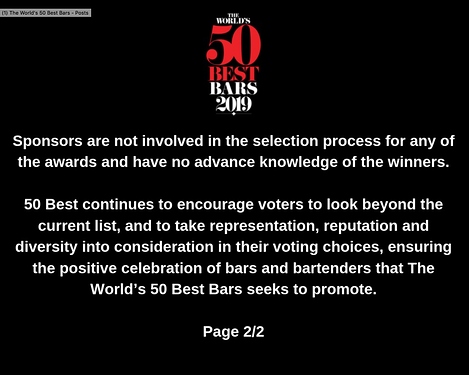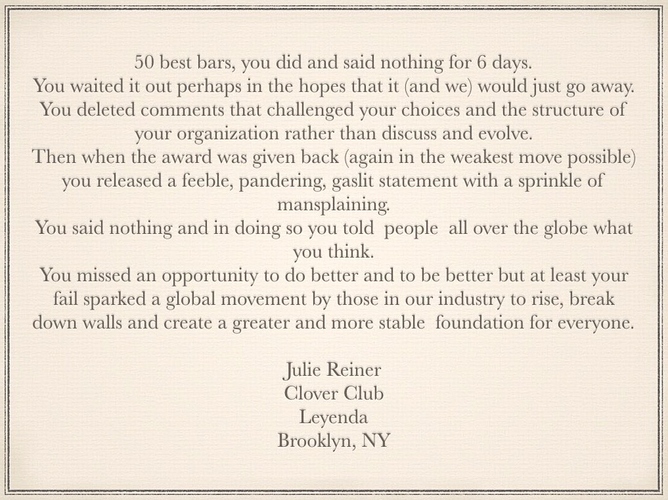A bruhaha erupted on Facebook and Instagram on Friday, October 4, when Julie Reiner posted the following in response to an award given to Charles Schumann by The World’s 50 Best Bars 2019:
Charles Schuman asked me to be in his film, and then told me in the interview that women should only work the lunch shift making way for the real (male) bartenders. He is a proud misogynist, and our industry not only accepts this, but continues to reward him with lifetime achievement awards. How is it ok to overlook his blatant sexism?
The film in question is this YouTube Movie, Bar Talks. Also, this 2009 article from The Japan Times has been cited, although the article’s author, Nick Coldicott, has now renounced his own writing, stating,
I wasn’t good enough, or careful enough to convey it properly. Charles has a very particular sense of humour, and I didn’t know him well enough then and wasn’t skilled enough to profile him well. I’ve had many chances to get to know him better since then, and I’ll say this: I’ve never known a bartender more loyal to his employees or who commands more loyalty, and that’s true of women and men. I can’t comment on the movie clip, which was super uncomfortable, but the article part: that’s my fault. (Facebook, Oct 7)
Despite his protestations, Coldicott may have gotten it more right than he realizes, but yes, there’s some room for nuance, and the language barrier must introduce some benefit of the doubt.
Various persons, including Helmut Adam (Mixology Magazin, BCB, Made in GSA), whose point of view I do not take lightly, rushed to defend Schumann, while acknowledging that Schumann needed to explain himself. As of this writing, we haven’t heard from Schumann or from The World’s 50 Best Bars. Needless to say, the comments on both sides contained a fair amount of ad hominem ugliness and dismissiveness that are usually strenuously avoided (in public) in this industry. It also was quite clear that many of the Americans had never heard of Schumann. Quite a few industry women—mostly Americans—have cheered Julie’s message, but we’ve seen more heat than light, so far, and the entire matter has the unfortunate characteristics of crossing language barriers and pitting America against Germany. The one thing we’re still not really talking about is sexism in the industry.
Alas, talking about sexism in any context is as hard, or harder, than talking about racism. I acknowledge that racism and sexism are systemic things, and that just as racism is something that mainly needs to be addressed by white people, sexism mainly needs to be addressed by males. So, yesterday, I gave it a shot: I engaged a German bartender who, in response to Helmut Adam’s post defending Schumann’s character, commented “People are too sensitive and get offended way too easily these days…”. I chose to engage this individual because I recognized his casually dismissive language and I noticed that he ran a bartending school. I got more than I bargained for. The exchange consumed my entire day. It was utterly exhausting. I did not do an ideal job—this was my first amateur attempt, and I never felt like I had the tools I needed. I was not apparently successful. Still, I am posting the transcript, below, with the last names removed. If this episode is at all illustrative and this forum can somehow add something constructive to a discussion of sexism in the hospitality industry, then I’m all for it.
Mike:
People are too sensitive and get offended way too easily these days…Fiona:
[eyerolling emoji]Martin:
Did that roll off the tongue easily for you, Mike? I wonder which “people” you have in mind? Your inferiors? Women? Me?Mike:
[links to a dictionary definition of “people”]Paul:
So, you don’t find sexism offensive Mike?Mike:
Sexism yes, what CS said: not as much as you do I guess. I don’t agree with what he said, however I do think the world has bigger problems to deal with.Martin:
Ok, so basically, you agree sexism is offensive in principle, but you—yourself—are privileged to not suffer from it, so it must not be that important? You rush to be dismissive, and in so doing, you dismiss the experiences and concerns of a lot of women in your industry. The world may indeed have bigger problems, but that’s not what we’re talking about here. Perhaps it’s time to listen more?Mike:
Listen? Lots of the stuff you just wrote here came from YOU, I never said those things…maybe you should listen more as well? Don’t point your finger at me. In my bar, I hired more than 60% women, I had female bartenders, female DJs, I even had a female bouncer… And they earned exactly as much money as the male employees! If you’re mad at CS, then be mad at him, not at me!!![J]ust so you understand my point of view (and please read my words carefully and do not interpret them in a different way): I don’t judge people by what the did/said ONCE. I judge them by what the do/say for a longer period of time. Example: there ist a terrible video on YouTube, where Charles Schumann is making a Whiskey Sour (it’s still online). That video is horrible, a terrible example of a bartender. Does this one video make him a terrible bartender? Of course not! His words are harsh, and I don’t agree with him, but nobody recalls when he was a judge at a cocktail competition, and he chose the FEMALE bartender as the winner, nobody remembers how he gave good advice to female bartender friends of mine, who still look up to him as their “godfather”. I know you and many others are angry about what he said, and that’s fine. I don’t shares that anger, because the truth is: NO female bartender will lose her job because of what he said, no female bartender will NOT get hired because of what he said, it won’t affect females at all. There are more females behind bars than ever, and that’s great! So why bother??
Martin:
I fear you have missed the point, Mike, but I will give you the benefit of the doubt. If it is true that you are involved in running a bartending school, I hope you will take a new interest in the chronic problems with men that women in the hospitality industry face, because you are in a position of influence. Cheers!Mike:
I always tell the female students: every male colleague, every male client will not take you serious as a bartender, just because you’re a female. And the best way to handle that is to be better, more professional than everyone else. And I teach them the tricks and the knowledge to do just that. And it works, they get the respect, the are not seen as females, they are looked at as professional bartenders. One girl was a busser and always got yelled at by the head bartender. And guess what: she is now HIS boss!!! Don’t judge me just because I don’t share the same anger as you…Martin:
I think you’re missing the point. Moreover, the approach you describe—sucking it up and working harder—sure sounds exactly like the old system that these women are protesting, however practical and pragmatic it may seem to you.Mike:
It produces results, results that changed these women’s lives in a positive way. I’m a foreigner wherever I live, and the only way not to be treated as a foreigner is to be better than others, and it works! I can sit around and “be offended” due to the (hidden) racism but it won’t change a single thing. You find CS’s words offensive, fine, I don’t because they don’t have any affect on anyone’s lives, they don’t matter, they do not make any difference.I’m not missing the point, I’m showing you why “in so doing, you dismiss the experiences and concerns of a lot of women in your industry.” is completely wrong, I have brought a lot of young women INTO this industry, preparing them as best as I could to be successful. Instead of “being offended”, instead of “protesting”, I choose to make a difference, to act, not just complain… I’m NOT missing any point.
Martin:
Sorry, but you are missing the point. From the beginning of this exchange, I’ve been trying to show you that your tossed off remark about people being too sensitive was dismissive. (In fact, it’s a textbook example of the language of oppression.) It was dismissive. See Fiona’s little eye-rolling emoji response? That was a good clue. You doubled-down (bigger problems). Then you told me about how wonderful you’ve been, hiring women and training them to be successful in a sexist industry—that actually great! But it’s still a sexist industry. So, in the end, this is not actually about the women. It’s about the men. This is about you. This is about the men you train. This is about what you say and how you say it, and WHY what you say and how you say matters. It does matter, and we need to do better.Mike:
OK, here’s an example (regarding your point about me not being offended just because I’m male): Had CS said that Asians do not belong in/behind bars, do you think I would be offended? Of course not! I couldn’t care less who says what … Regarding my remark about people (in general, I never said “you people” or spoke about anyone in particular… I feel like in Tropic Thunder… ) being too sensitive: I hate this shitstorm attitude, which is a part of our modern day culture. Complaining via social media doesn’t take courage, it doesn’t take any effort, it’s easy to point at others and condemn them on social media. Why not confront them in real life? Send them a direct message? Call them? Talk to them? Try to change their mind? Spit in their face if you will, but do something REAL? It’s not “language of oppression” (how do you come up with this stuff?), it’s because I like heros in REAL life, not on social media. And regarding the “bigger problems” remark: as I’ve said many times, what CS said is wrong, but it won’t affect anybody’s life, job etc. Other topics, like Brexit, trade war, climate change, war in the middle east etc will affect millions of lives. Friends will lose their jobs, their business, their families and lives possibly. Every female bartender out there still has her job, her career, and there will be many more new female bartenders to hit the scene in the future, despite of what CS said! And regarding your last point: it’s not the industry that’s sexist, it’s society (male CLIENTS too will not respect a female bartender unless she proves them wrong), I can’t change society, I can’t change how EVERY man thinks! But I can help women be better bartenders and change people minds one step at a time, honest and well earned respect! - feel free to hit me a DM if you feel like continuing, I think we have hijacked Helmuts post way too muchMartin:
The language thing is actually quite interesting (and deeply unsettling): there is a collection of things we all say casually—reflexively, unthinkingly—whose only purpose is to silence dissent. They’re dismissive, and their (not necessarily intentional) effect is to prop up systems of racism, sexism or ____ism. We white Americans use them all the time.I am quite sympathetic to your distaste for the messy, ugly social media stuff, but your alternatives aren’t real alternatives, are they? This isn’t really just some obscure personal disagreement. You contend that none of this will affect anybody’s life, job, etc., but there seem to be an awful lot of women around who don’t agree.
Society is sexist, but you can influence your part of society to make it less so. But you cannot do that until you recognize the ways you are unintentionally a part of the problem. And so am I. And so is Charles Schumann (and this is the first and only time I have mentioned him in this exchange).
I’m going to bed soon. Thank you for not storming off in a huff. I respect that.
Mike:
Women disagree to what CS said, but who’s career was affected by his words? Nobody’s… And just because something doesn’t offend me does NOT mean I agree with it. It simply isn’t important enough for me to pay attention, because as I said, even though many people’s feelings are hurt by what he said, nobody got fired because of this. The Thomas Cook disaster for example is a whole different story, because many people lost their jobs without any wrongdoing…The first question you sent me is a perfect example: In my post I talked about people in general. However, you misunderstood this and thought I was speaking to a specific group of people. I did not, but that’s how you wanted to understand my post. When I said there are more important topics, you immediately thought I don’t care about sexism because “I am privaleged to not suffer from it”, which again is wrong. I said the CS story is not important enough, I wasn’t talking about sexism um general. Again you understood what you wanted to understand, not what I actually said. I told you: I don’t just TALK or POST about equal rights, I ACT accordingly, pay women the same wage as men, give women the same jobs as men, etc, I do not make a difference between the sexes. Here’s another example: When I’m at the playground with my son, he likes to hang with his arms and pretend he’s a monkey. The other day I was at a playground with a black friend of mine and his son, who was hanging by his arms as well. I called him a monkey and immediately got a response from behind me: how dare I call this black kid a monkey, I’m a racist. I told this person: " YOU are the one seeing different colors of skin, I just see two kids I love pretending to be animals." As I said before, feel free to DM me if you want to continue, but please do NOT misread my words.
[At this point, I decided there was no point to continuing the exchange]


